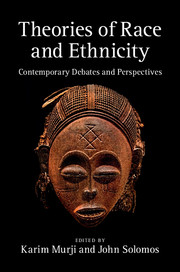Book contents
- Frontmatter
- Contents
- Notes on contributors
- Preface
- 1 Introduction: situating the present
- Part I Debates
- Part II Perspectives
- Introduction to Part II
- 8 Superseding race in sociology: the perspective of critical rationalism
- 9 Critical race feminism
- 10 Performativity and ‘raced’ bodies
- 11 Racism: psychoanalytic and psychosocial approaches
- 12 The sociology of whiteness: beyond good and evil white people
- 13 (Sexual) whiteness and national identity: race, class and sexuality in colour-blind France
- 14 Racial comparisons, relational racisms: some thoughts on method
- 15 Conclusion: back to the future
- Index
- References
8 - Superseding race in sociology: the perspective of critical rationalism
Published online by Cambridge University Press: 18 December 2014
- Frontmatter
- Contents
- Notes on contributors
- Preface
- 1 Introduction: situating the present
- Part I Debates
- Part II Perspectives
- Introduction to Part II
- 8 Superseding race in sociology: the perspective of critical rationalism
- 9 Critical race feminism
- 10 Performativity and ‘raced’ bodies
- 11 Racism: psychoanalytic and psychosocial approaches
- 12 The sociology of whiteness: beyond good and evil white people
- 13 (Sexual) whiteness and national identity: race, class and sexuality in colour-blind France
- 14 Racial comparisons, relational racisms: some thoughts on method
- 15 Conclusion: back to the future
- Index
- References
Summary
To qualify for the award of a PhD, a candidate has to demonstrate that he or she has made an original contribution to knowledge. This simple proposition encapsulates the most important characteristic of the philosophy which, after the work of Karl Popper, is known as critical rationalism. It focuses on the growth of knowledge. The candidate has to identify a segment of existing knowledge, examine its nature, present the results of new research and then show that he or she has, perhaps in small measure, expanded that knowledge.
This chapter reviews the origin of the academic study of racial and ethnic relations in Britain, noting how that study has broadened and how, within it, one line of inquiry has continued, acquiring new impulses. It contains an autobiographical component. Its ambition is to show that it is easier for a candidate to make a contribution to knowledge if he or she appreciates how previous contributions have come about, reflecting both the academic environment of the times and the imagination of individual researchers.
The chapter maintains that the study of racial and ethnic relations in British universities began in 1947 with the appointment, at the London School of Economics, of Dr Kenneth L. Little as assistant lecturer in anthropology, with special reference to race relations. As there was, in the British academic world of 1947, no agreement on what should be taught under this title, the appointment represented amajor initiative on the part of Raymond Firth, the professor of social anthropology in the school.
- Type
- Chapter
- Information
- Theories of Race and EthnicityContemporary Debates and Perspectives, pp. 143 - 161Publisher: Cambridge University PressPrint publication year: 2014
References
- 8
- Cited by



